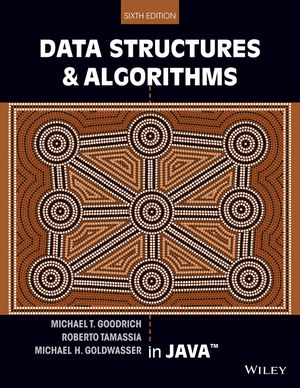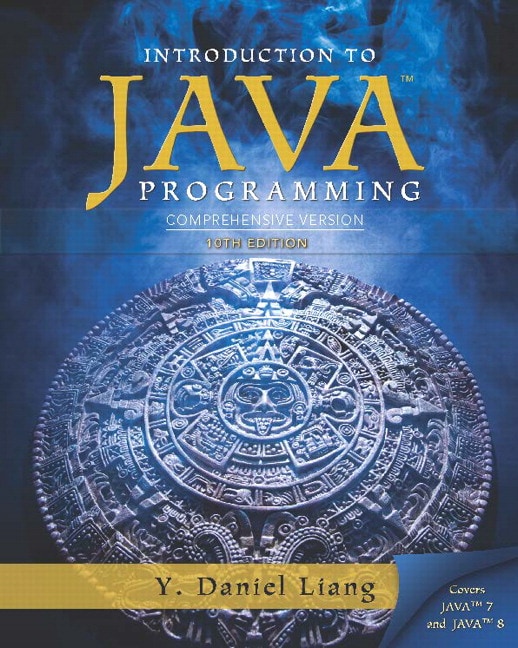Textbook(s)
Data structures books
 |
Data Structures and Algorithms in Java, 6th edition, Michael T. Goodrich, Roberto Tamassia, Michael H. Goldwasser, Required, earlier editions of the book should be fine. |
 |
Open DSA Highly recommented - available online OpenDSA is an open source project whose goal is to provide online course materials for a wide range of Data Structures and Algorithms courses. It is currently funded by two National Science Foundation grants: TUES program grant DUE-1139861 and EAGER program grant IIS-1258571 . |
Java reference books
 |
Introduction to Java Programming, any edition Daniel Liang, This is your cs101 textbook. It is a good resource for refreshing the Java material. |
 |
Think Java: How To Think Like a Computer Scientist, Chris Mayfield, Allen Downey, Optional Java resource Open book - available online |
 |
Java, Java, Java: Object Oriented Problem Solving, Ralph Morelli, Ralph Walde, Optional Java resource Open book - available online |
Prerequisites
Passing CSCI.UA.0101 with a grade of C or better.
You are expected to know and remember the material from CSCI.UA.0101 course. If you took the course a few semesters ago and/or do not remember parts of the material, start reviewing it during the summer/winter break.
If you took an equivalent of this course at a different school, you need to make sure that you are familiar with Java. We assume you know enough Java to write fairly large programs right at the beginning of the semester.
Grading
Your grade will be based on:
- exams (65%): one midterm exam (25%) and the final (40%),
- programming projects (30% total)
- recitaion activities, quizzes (5% total)
- activities will be completed during recitations (usually in small groups) - you cannot get credit for these unless you are in the recitation
- pop-quizzes will be given during lectures and recitations, not announced - no make-up quizzes will be given
Grades will be determined using the following scale:
A 95-100
A- 90-95
B+ 87-90
B 83-87
B- 80-83
C+ 76-80
C 72-76
D 65-72
F less than 65
The grade of Incomplete is reserved for students who, for legitimate and documented reason, miss the final exam. The grade of Incomplete will not be given to student who started falling behind in class. Those students should withdraw from the class or switch to Pass/Fail option.
Absences (excused and unexcused)
I generally do not take attendance.
The missed quizzes and recitation activities cannot be made up. Four lowest scores on quizzes and recitation will be dropped at the end of the semester. This is to account for any excused or unexcused absences.
The exams can be made up only in case of an excused absence with appropriate documentation.
If you will miss an exam due to a religious observance, please familiarize yourself with University Calendar Policy on Religious Holidays and talk to me well in advance to come up with alternative arrangements.
Recitations
Recitations for the course are used to answer your questions regarding the material and posted projects.
During recitations you will also get some hands on practice by participating in (usually group) activities. It may be a good idea to bring a laptop to recitations (although it is not a requirement since you will only need one laptop per group).
Assignments
There will be two different types of assignments in this course:
- programming projects, and
- do not hand-in homeworks (DNHI).
Programming projects (30% of your final grade) will be given on a regular basis. In general, they will be due one-two weeks after they are assigned. They will require you to write and, often, read significant amount of code.
No programming projects can be accepted after the last day of classes.
Late and missed programming projects:
For each project you will have a 5 hour buffer window after the due date. You can submit or resubmit the project during this time without any point penalty. The late project submissions lose 30% of their value for each day they are late. If you submit the project 5-24 hours late, the maximum score is 70 (instead of 100). If you submit the project 24-48 hours late, the maximum score is 40 (instead of 100).
Broken programming projects:
If you hand in a program that does not
compile or crashes when it is run, you will get a grade of zero on it.
As you are working on your code, make sure that it compiles and does what
you expect it to do. Test frequently, not only after you write hundreds of
lines of code.
Do not hand-in homeworks (DNHI) will be given to encourage you to
practice the material that we discuss in class. The problem sets will be
posted as separate homeworks or inicated in the lecture notes. They will
serve also as review questions for exams.
Recitations are the good place to have them discussed!
Academic Integrity Policy
I use MOSS (a system for detecting software plagiarism) to make sure that the submitted assignments are not duplicates of one another. Your code has to be your own.
I follow the department's academic integrity rules.
In short, it is fine to talk to other students about your ideas and your
programs, but it is not fine to work together on
assignments or copy someone else's assignment. You cannot copy other people's
work without giving them a proper credit (and
part of your grade).
Any sharing or copying of assignments will be considered cheating.
By the rules of the College of Arts and Science, I am required to report any incidents of cheating to the department.
If you have any doubt if something that you are doing qualifies as academic dishonesty, talk to me!
So what is cheating?
- Sharing code/solutions: by copying, retyping, looking at, or supplying a file (this includes posting partial or complete solutions on the course discussion board, a public repository - think GitHub, or any place where others can access it)
- Coaching: helping your friend to write their code line by line (send them to the tutors or office hours, if you want to help them)
- Copying code from previous course or from elsewhere on WWW. You are only allowed to use code from the textbook and what we supply on the course website.
- Hiring someone to complete your assignments for you.
What is NOT cheating?
- Explaining how to use systems or tools
- Helping others with high-level design issue
Exams
There will be a midterm and a final exam. All exams are cumulative.
Missing an exam: There will be no make-up exams. Failure to take an exam counts as a zero grade on that exam. The only exception to this rule is for students who have a legitimate serious medical or personal emergency (documented). These students need to talk to me as soon as possible (trying to excuse an exam absence three weeks after it happened will not work).
Topics Covered
- Java features: abstract classes, interfaces, inheritance, polymorphism, generics, iterators, exception handling, file I/O
- Recursion
- Worst case asymptotic running time analysis
- Abstract data types
- Lists, stacks, queues
- Trees (binary and binary search trees, AVL trees)
- Sorting algortihms (merge sort, quicksort)
- Hashing and hash tables
- Priority Queues
Additional topics (time permitting):
- Graphs
- Other sorting algorithms
For detailed schedule, see the Daily tab of this page.
Academic Email Etiquette
-
Check the school email address on a regular basis. You can simply forward its content to another email account that you use regularly.
-
Use your school's email account to send emails to professors, instructors, TA's, graders, administrators, etc. OR make sure that your email address contains your true name, not "frabjous@gmail.com", "BabyGurl@yahoo.com" or some other cool alias.
-
Start your email with proper salutations! Use the correct titles (Professor, Dr., etc.) and spell first and last names correctly. If you are on the first name basis with your instructors, use their names, not "Hey". For example: "Dear Professor Drummer" or "Dear Robert", not "Hey Bob".
-
Sign your name under the body of your email, otherwise you expect people to read emails from anonymous.
-
Do not write everything in upper-case letters. Do not write everything in lower-case letters.
-
Make sure you included everything you wanted before hitting send. Don't send three emails one after another because you forgot something in the first one.
-
Proofread the text in your email before sending it. Most of the email clients check for typos, but they cannot tell if your email makes much sense. Read it, before you send it.